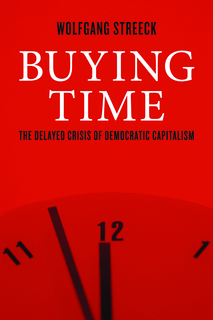Transcript
This podcast is presented and produced by Craig Barfoot
In 2007, Alan Greenspan, then Chairman of the US Federal Reserve was asked by the Swiss newspaper Tages-Anzeiger who, in his view, would be the next president of the United States. He replied,
“We are fortunate that, thanks to globalization, policy decisions in the US have been largely replaced by global market forces. National security aside, it hardly makes any difference who will be the next president. The world is governed by market forces”
So, is electoral democracy compatible with the forces of global capitalism? Or are western governments just ‘buying time’ with short term economic fixes in order to win elections, while real power lies not with the people but somewhere else entirely?
These are the questions at the heart of Craig Barfoot’s conversation with German sociologist Professor Wofgang Streeck, Director of the Max Planck Institute as they discuss Professor Streeck’s book Buying Time: The delayed crisis of democratic capitalism (Verso, 2014)., which is based on his 2012 Adorno lectures.
Tracing the transformation of postwar capitalism that began in the 1970s , Wolfgang Streeck explores how the relationship between democracy and capitalism in Europe and the US has changed and continues to change. He argues that western governments have been ‘buying time’ with public spending deficits and private debt (in order to win elections), and that the 2008 economic demonstrated the conflict of interests between the financial markets and the popular will.
After World War II, there was a consensus that those who had fought a war should have the right to the full benefits of citizenship, which included a share of the growing prosperity that came from a growing economy. But now, says Professor Streeck, we have a democracy that is very different – collective bargaining, a system that ensured wages kept pace with growth, and allowed for redistribution both for social justice and to stimulate the economy, is largely gone. Increasingly growth is seen as flowing from the empowerment of the rich, for example via tax cuts.
Governments have bought time, but can they do that for ever?
Tags: Alan Greenspan, Buying Time: The delayed crisis of democratic capitalism, Global capitalism, Max Planck Institute


Subscribe with…